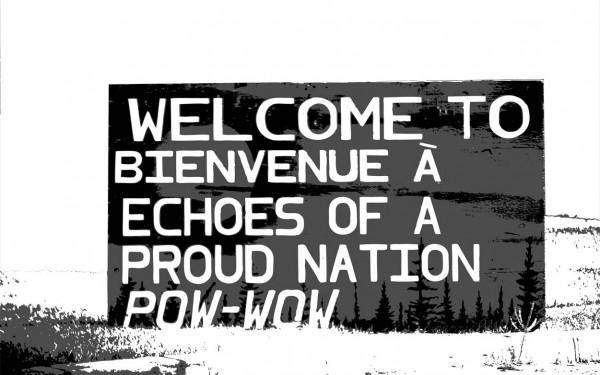Help Across Borders
Kahnawake Community Extends Helping Hand With Clothing Drive
Winter is coming to South Dakota, and that means a hard few months are approaching the Rosebud Indian Reservation.
It means power outages that last up to a week. It means no heat if you don’t have a propane heater or wood-burning stove. It means winter jackets and blankets that are a necessity, not a luxury. It means others are reaching across borders to help.
The Kahnawake Reservation is not a wealthy part of the Montreal region—unemployment has on occasion reached as high as 50 per cent. However, when members of the Mohawk reserve’s community heard about the Rosebud Reservation, they decided that something had to be done.
Over the past week, donations started pouring in for a clothing drive meant to help those in Rosebud get through the cold months ahead.
On an overcast Saturday, Kahnawake’s Golden Age Club, a small building surrounded by a stretch of asphalt was working overtime to get the clothes, toys and blankets folded, boxed up and loaded onto the cargo trucks that will take them across the border.
As packing tape guns noisily sealed the boxes shut, Roxanne Whitebean talked about solidarity.
“We’re doing well [in Kahnawake], so we want to help sister communities,” she said.
“We think it’s important that people know how the indigenous people are living throughout Turtle Island [North America] because a lot of them, I’d say about 90 per cent of them, live in third world conditions. The public doesn’t know that, they don’t realize that, so it’s very important and we just really want to help people.”
If there’s any community that needs help, Rosebud is it.
Neighbouring Lakota reservation Pine Ridge, Rosebud belongs to the Sioux tribe and was the subject of a recent piece on ABC’s 20/20 With Diane Sawyer news magazine program. The episode showed shocking levels of poverty, including some families that live in trailers with leaky roofs, no heat, and with five or more children sharing a bedroom.
Dropout and alcoholism rates are high, each topping 70 per cent. Government aid, except for welfare and unemployment checks, is almost non-existent, as there is no profitable agreement allowing the government to drill for oil like there are in some other reservations in the U.S.
Although Rosebud is home to a casino, it provides little money or employment to the community at large, and conditions are similar to Pine Ridge. With no major industry on the reservation, and most of those who are employed working directly for the tribe, unemployment levels can be as high as 80 per cent.
“It got bad because when they were removed from their lands, they were put in territory which was the badlands,” said Whitebean.
“There isn’t fresh drinking water, they can hardly plant. It’s basically a death sentence. Along with that, they also had residential schools. They can’t find work; people don’t want to hire them. If people think that things have changed much, they haven’t.”
Cathy Young is a resident of the Rosebud Reservation, and has been helping to coordinate their side of the clothing drive. She expressed gratitude at the donations, saying the level of poverty and lack of government aid has made living conditions dire.
“Most of [the people on the reservation] are tribal members,” she said. “They’re mostly on a fixed income. A lot of their money goes to their bills at the first of the month, and they don’t have much left to get their kids clothes or shoes.”
She explained that Rosebud gets their electricity from a town 60 miles away. During snowstorms, power lines tend to get knocked down once or twice a winter, and the outages can last for up to three weeks.
While this is bad for everyone, it’s the older residents, who live far from the more populated areas, who are hardest hit.
“We’re going to get a list of the elderly and we have some that live way out in the country,” she said. “It’s hard for them to get around in snow time, and I think they’re the ones that really need the help. It can be 10 to 15 miles away from the nearest town.”
What makes the clothing drive so remarkable is almost no assistance was given by Kahnawake’s band council, other than helping to obtain papers to get the trucks across the border.
Once there, more stuff will be picked up from the Aquasasne reservation in New York, which will be distributed among four other reservations on the way to Rosebud.
“We’re just really trying to help each other,” said Whitebean. “We’re doing it for the kids, to help them feel uplifted and show support and let them know that they’re not alone.”
While the effort would be heart-warming enough if this was just a one-shot deal, Whitebean said she is looking forward to further strengthening the tie with Rosebud and support them in the future.
“We are looking to set up a foundation, we just have to get everything in order. It’s very new to us, we’re overwhelmed a little bit, but it’s looking really good.”
While she looks ahead to the years to come, this year, winter is coming to South Dakota.
It means help can’t come soon enough.

1_900_600_90.jpg)
2_900_600_90.jpg)



web_600_375_90_s_c1.jpg)
2_600_375_90_s_c1.jpg)
ED1(WEB)_600_375_90_s_c1.jpg)